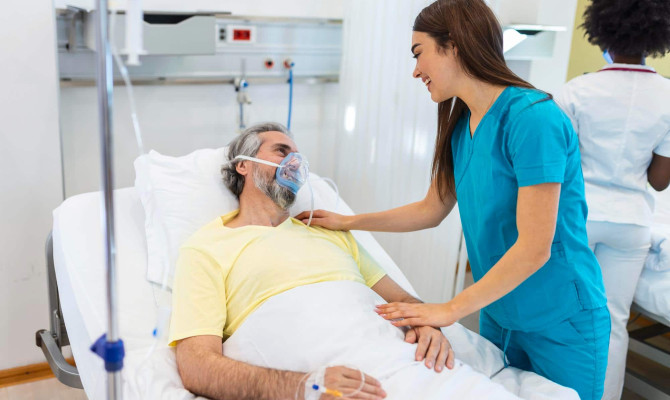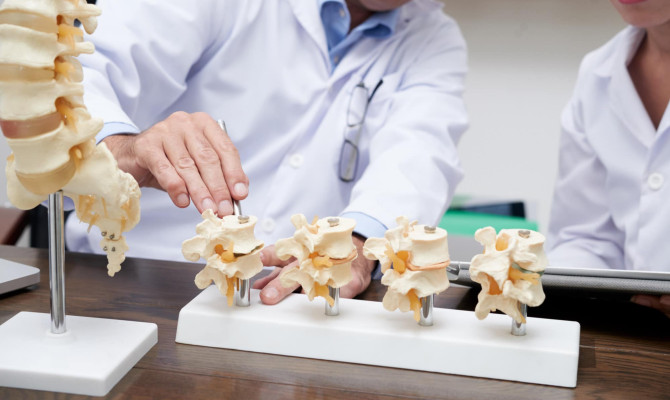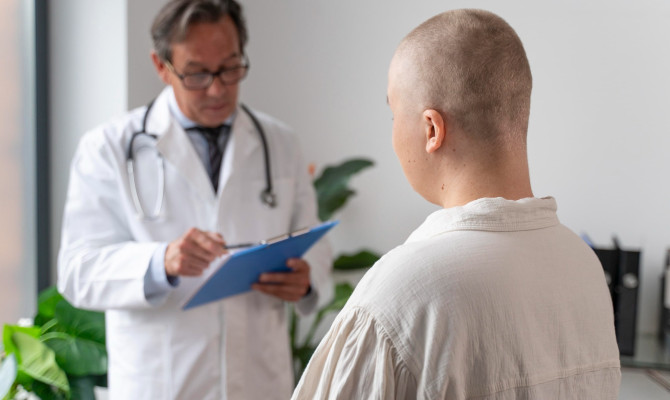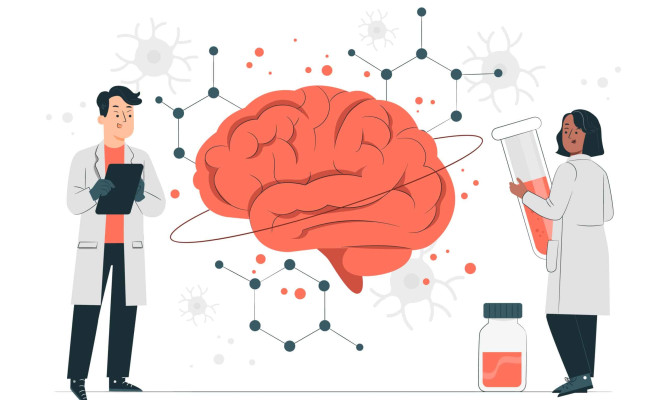Brain tumor: Understanding the Causes, Symptoms, and Management

- Brain Tumor
- 17 Aug 2023
Overview
What is Brain tumor?
The development of aberrant brain tissue cells, in or around brain, is brain tumor. Both benign and malignant brain tumors are possible.
The brain tumor has long interested scientists and puzzled medical experts as a powerful opponent hidden within the very center of our consciousness.
We will delve into the characteristics of brain tumors, looking at their categorization, causes, symptoms, and available diagnostic methods.1Overview| Researched based study from Nlm.nih.gov
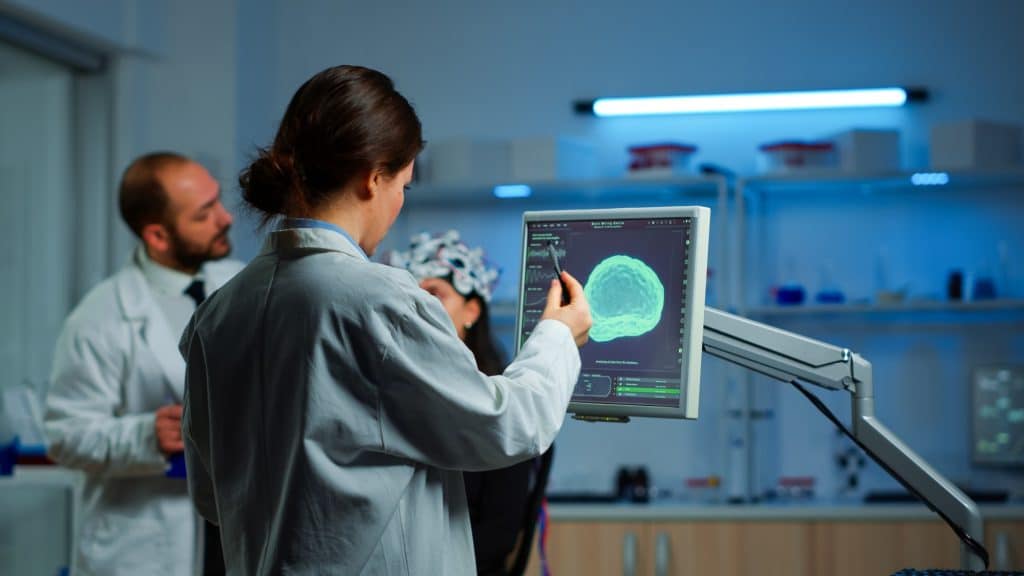
Symptoms
What are the symptoms of Brain tumor?
- Headaches
- Seizures and loss of consciousness
- Memory problems, confusion, or changes in cognition.
- Vision and hearing difficulties
- Difficulty in standing and walking.
- Fatigue
- Difficulty in speech and language abilities
- Nausea and vomiting
It’s important to remember that these symptoms are not exclusive to brain tumors and may also be linked to other diseases. If you experience any of the following, contact a doctor:
Headaches
- A sign can be frequent or severe headaches that last long or worsen with time. These headaches may also be associated with nausea, vomiting, or strange visions.
Seizures
- Seizures that are unexplained and include convulsions or unconsciousness may be a sign. They can happen to anyone, even people who have never had epilepsy before.
Behavioral and cognitive changes
- It may impact cognitive processes, modifying memory, focus, and problem-solving skills. It’s possible to experience personality changes like sudden changes in mood, irritability, or unusual behavior.
Vision and hearing problems
- Vision or hearing problems can result from brain tumors close to the auditory or optic nerve circuits. These can include double or blurry vision, partial or total blindness, or tinnitus, which is buzzing in the ears.
Difficulties with coordination and balance
- Balance and coordination issues can result from tumors that damage the cerebellum or other regions of the brain involved in motor control. Stumbling, trouble walking, or clumsiness could be signs of this.1Symptoms| Researched based study from Nlm.nih.gov
Nausea and diarrhea
- It might hamper the brain’s normal functions and raise the pressure inside the skull. This may result in prolonged nausea and vomiting, especially in the morning or after changing one’s body position.
Weakness or numbness
- It may obstruct the nerves’ usual ability to transmit information. This may cause a specific area of the body to become tired or numb, usually on one side of the body.
Changes in speech or language ability
- The areas of the brain that regulate speech and language can be affected by changes in these skills. This may result from slurred speech, trouble finding the correct words, or difficulty understanding and comprehending language.1Symptoms| Researched based study from Nlm.nih.gov
Causes
Causes of Brain tumor
Although there are many potential causes, the precise one is often still unknown. The following are some probable causes and risk factors:
Genetic factors
- A higher chance of developing brain tumors is linked to specific hereditary diseases, including neurofibromatosis types 1 and 2, Turcot syndrome, etc.
Family history
- A brain tumor may be slightly more likely to develop in people with close family members who already have one.
Ionizing radiation exposure
- The risk may increase with high-dose radiation exposure, such as that experienced during radiation therapy for various cancers or from nuclear accidents.
Age
- While medulloblastomas are more prevalent in youngsters, specific forms, such as gliomas and meningiomas, are more common in older adults.
External factors
- A higher risk may be linked to prolonged exposure to environmental contaminants, such as specific chemicals or solvents. However, there is limited and insufficient proof confirming any one reason in particular.
Immune system disorders
- An increased risk exists for people who have certain conditions, such as AIDS, or who are receiving immunosuppressive therapy.1Causes| Researched based study from Nlm.nih.gov ,2Causes| Researched based study from Nlm.nih.gov ,3Causes| Researched based study from Cancerresearchuk.org
Types
Types of Brain tumor
They are categorized according to their behavior, where they are located in the brain and the cell types from where they emerged.
Gliomas
- Glial cells, which are brain support cells, give rise to gliomas. The majority of brain tumors occur in these categories.
Meningiomas
- Cancerous tumors called meningiomas grow from the meninges, which are the coverings that protect the brain and spinal cord. They frequently grow slowly and are benign. Women are more likely to have them.
Pituitary adenomas
- They are benign tumors that grow inside the pituitary gland, a little organ near the base of the brain. Depending on the hormones they affect, they can influence hormone production and result in various symptoms.
Schwannomas
- Schwann cells, which provide the coating that protects nerve cells, are the source of schwannomas.
Craniopharyngiomas
- Uncommon tumors that can develop close to the pituitary gland. They frequently affect kids and teenagers, leading to hormone abnormalities and eye issues.
Primary central nervous system lymphomas
- White blood cells termed lymphocytes are responsible for primary central nervous system lymphomas. Most of the time, they affect the brain or spinal cord and are more common in people with compromised immune systems.9Types| Researched based study from Ninds.nih.gov
Diagnosis
Diagnosis of Brain tumor
A physical examination and medical history
- There will be a complete medical history and physical assessment. Your symptoms, duration, progression, risk factors, and other medical issues will be raised.
Neurological testing
- Your cognitive function, reflexes, physical strength, coordination, sensory perception, and mental state will all be tested throughout this procedure.
Imaging tests
- Strong magnets and radio waves are used in MRI to provide detailed images of the brain. They may help in locating, sizing, and characterizing a tumor.
- CT scans determine the tumor’s location, size, and density.
Biopsy
- Sometimes, a biopsy is done to obtain a sample for analysis.
Analyses of cerebral spinal fluid
- A lumbar puncture may be used in certain situations to collect a sample of cerebrospinal fluid (CSF) for examination. Any irregularities or signs of tumor cells may be found in the fluid that surrounds the brain and spinal cord.
Genetic analysis
- Tumor tissue may undergo molecular testing to find specific mutations or variations that can inform treatment choices.4Diagnosis| Researched based study from Nlm.nih.gov
Treatment
Treatment of Brain tumor
Treatment of brain tumors
A group of medical experts with specialties in neurology, neurosurgery, radiation oncology, and medical oncology usually decides on the treatment plan. The main choices consist of the following:
Surgery
- When it is practical, surgical removal is frequently the first course of treatment. The goal is to get rid of the tumor as much as possible without damaging vital parts of the brain. Particularly for brain tumors, total excision of the cancer occasionally results in a cure.
Radiation therapy
- To remove or reduce tumor cells, radiation treatments such as high-energy X-rays may be used. Targeting any leftover tumor cells may be done as the main form of treatment if surgery is not an option.
Chemotherapy
- It involves using medications that kill or stop cancer cell development. It frequently takes place in combination with several medical procedures. It may be given before, during, or after surgery, radiation therapy, or both. It is commonly given orally or intravenously.
Targeted treatment
- Some tumors have particular genetic alterations or molecular traits that specific medications can address. Targeted therapy tries to obstruct the precise chemicals or pathways required for the development or survival of tumors.
Supportive care
- Controlling symptoms is important for raising quality of life. This might include drugs to treat seizures, pain, reduce swelling, and other symptoms—rehabilitation therapies, including speech, occupational, and physical therapy.5Treatment| Researched based study from Nhs.uk 6Treatment| Researched based study from Cancerresearchuk.org
Can brain tumors be cured?
- The prognosis for people with brain tumors depends on several factors, including the type, location, grade, size, and overall health condition. Others might be more difficult to manage, even if some can be successfully treated and cured. 8Treatment| Researched based study from Nhs.uk
Prevention
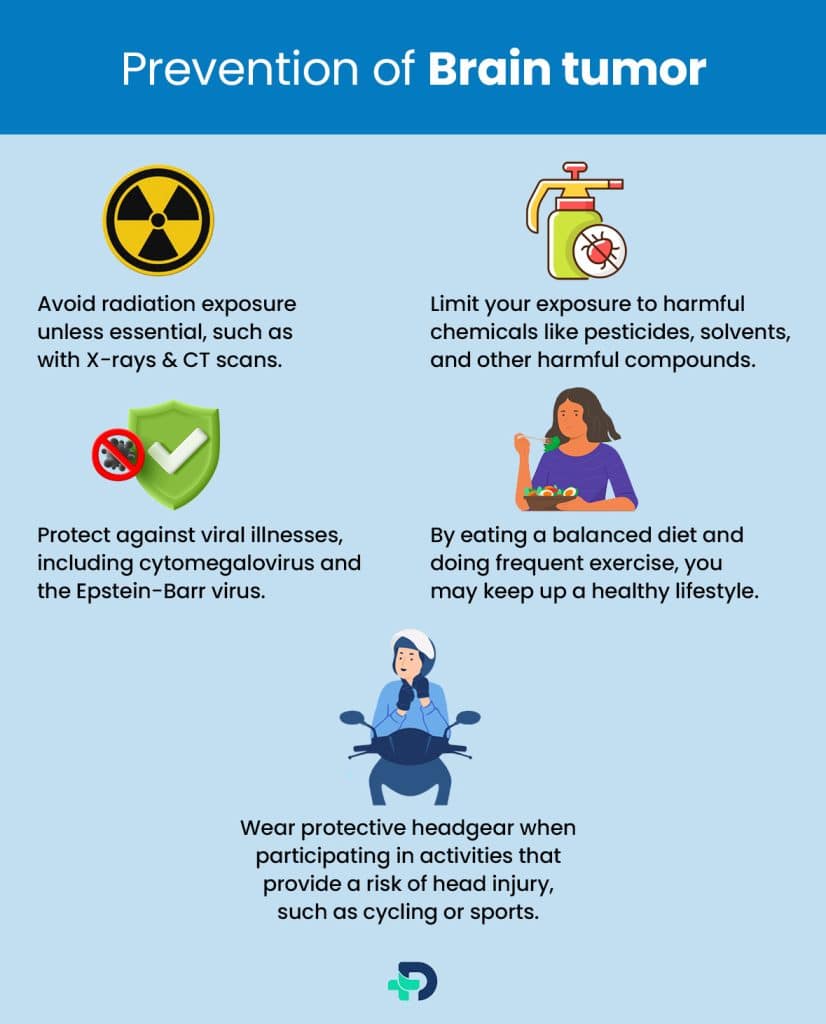
Prevention of Brain tumor
Although there are currently no known guaranteed methods, the following basic actions may help lower the risk or improve overall brain health:
- Avoid radiation exposure unless essential, such as with X-rays and CT scans.
- Limit your exposure to harmful chemicals like pesticides, solvents, and other harmful compounds.
- Wear protective headgear when participating in activities that provide a risk of head injury, such as cycling or sports.
- By eating a balanced diet and doing frequent exercise, you may keep up a healthy lifestyle.
- Protect against viral illnesses, including cytomegalovirus and the Epstein-Barr virus.
- Practice excellent hygiene, such as routine handwashing, and take the necessary steps to prevent contact with infected people’s bodily fluids. 7Prevention| Researched based study from Nlm.nih.gov
Any feedback on this article?
 This Articles content was accurate
This Articles content was accurate Very Informative Article
Very Informative Article I have a question or a comment
I have a question or a comment
 This article contains inaccurate content
This article contains inaccurate content This article was not helpful
This article was not helpful I have a question or a comment
I have a question or a comment
We appreciate your helpful feedback!
Checkout our social pages
References
-
National Library of Medicine
Brain Tumors | Overview | Causes | Symptoms
-
National Library of Medicine
Environmental causes of childhood brain tumors | Causes
-
Cancer Research UK
Risk and causes of brain tumors | Causes
-
National Library of Medicine
Primary Brain Tumors in Adults: Diagnosis and Treatment | Diagnosis
-
National Health Service
Benign brain tumour (non-cancerous) | Treatment
-
Cancer Research UK
Treatment for brain tumours | Treatment
-
National Library of Medicine
Effect of lifestyle and dietary factors in the development of brain tumors | Prevention
-
National Health Service
Brain tumours | Treatment
-
National Institute of Neurological Disorders and Stroke
Brain and Spinal Cord Tumors | Types












